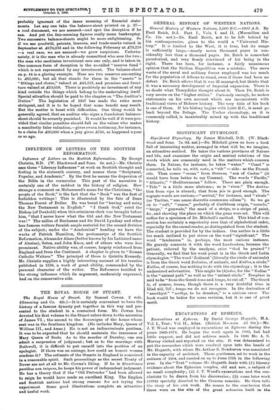INFLUENCE OF LETTERS ON THE SCOTTISH REFORMATION.
Influence of Letters on the Scottish Reformation. By George Christie, B.D. (W. Blackwood and Sons. 68. not.)—Mr. Christie sees three "Literary Influences " at work on Scottish thought and feeling in the sixteenth century, and names them "Scriptural, Popular, and Academic." By the first he means the dispersion of the Bible in the vernacular. This part of the narrative is certainly one of the saddest in the history of religion. How strange a comment on Mohammed's name for the Christians, "the people of the Book," is the fact that the " Book" was the first of forbidden writings ! This is illustrated by the fate of Dean Thomas Forret of Dollar. He was burnt for "having and using the New Testament in English." "I thank God," cried the Bishop (of Dunkeld) when this criminous clerk was brought before him, "that I never knew what the Old and the New Testament was !" The sallies of Buchanan and Sir David Lyndsay and other less famous writers furnish ample material for the second division of the subject; under the "Academical" heading we have the works of Patrick Hamilton, the protomartyr of the Scottish Reformation, Alexander Aline (better known by his Latinised name of Alesius), Seton, and John Knox, and of others who were less prominent. Native ability was, of course, largely reinforced from England and from the Continent. A chapter is given to "Roman Catholic Writers." The principal of these is Quintin Kennedy. Mr. Christie supplies a highly interesting account of his treatise published in 1558, a work of great ability, commended by the personal character of the writer. The Reformers testified to the strong influence which its argument, moderately expressed, had on the conservative side.
























































 Previous page
Previous page